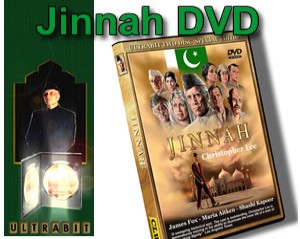Lord Dholakia launches
book on Jinnah:
London, March 4, 2005
A new book on Muhammad Ali Jinnah, founder of Pakistan,
has been released here at a function in the House
of Lords.

The book titled 'Jinnah - A corrective reading of
Indian History' - claims that the partition in 1947
was an accident of Indian history caused by a simple
personality clash between Jinnah and Mahatma Gandhi.
The book was released last night by Leading NRI Lord
Navnit Dholakia.
Written by Asiananda, a Netherlands-based Indian
scholar, the book will be launched in New York later
this month. The book will be launched in New Delhi
in April. PTI
Lord Navnit Dholakia
Navnit Dholakia was appointed Baron Dholakia of Waltham
Brooks and was introduced to the House of Lords in
1997. Lord Dholakia was appointed Deputy Lieutenant
for the County of West Sussex in 1999. He is Chairman
of the National Association for the Care and Resettlement
of Offenders and also Chairs its Race Issues Advisory
Committee. He has been on the Council of Save the
Children Fund. He serves on the Council of the Howard
League for Penal Reform and is on the Editorial Board
of the Howard Journal. He is a trustee of the Mental
Health Foundation and is on the Governing Body of
the Commonwealth Institute. Lord Dholakia is also
on the Management Board of the Policy Research Institute
on Ageing and Ethnicity. In addition to these activities,
Lord Dholakia is a member of the Mannheim Centre for
Criminology and Criminal Justice at the London School
of Economics. He is a member of the Home Secretary's
Race Forum. Lord Dholakia is a member of the Home
Affairs team and is a Liberal Democrat Whip. In the
Lords he serves on the Select Committees on the House
of Lords Offices and European Communities Sub-Committee.
He is a member of the House of Lords Appointments
Commission and is President of the Liberal Democrats.
New Delhi, January 09, 2003
I feel humbled by the honor I have received from
India.
Although I have been recognised by the Queen of England
[who awarded him the Order of the British Empire],
but when your own country recognises you, it is the
greatest honour you can expect in your lifetime.
Besides an award, this conference will give me the
tremendous opportunity for networking with our people
from other parts of the world. It will also identify
the common ground between Indians and Indian Diaspora.
We expect that there will be a follow up.
I am interested in what is happening in India but
what I will never do is interfere in the political
process. I am president of a political party and I
am only geared up for England. I have put my future
in UK where I am going to give my best, but I'll never
ever forget the land from where I came.
I would also like to admit that I would have never
succeeded in India as well as I have in the UK because
in my young days, it was quite difficult to succeed
here. It very much mattered who you are? Whom do you
know? How influential you are? I have seen many talented
people fall by the wayside in India. In the UK, it
is different. If you have the ability, you move forward.
Now, my expectations from India is to build a relation
with the third and fourth generation of overseas Indians
who are growing up now. We don't want our children
to grow up in a vacuum. We want those Indian ideas
which have stood the test of time over thousands of
years in the lives of our children.
I hail from the barber's community of Bhavnagar,
a city in the Kathiawad area of in Gujarat. I don't
hide my identity, I am very proud of it. Not just
Gujarat, there is a Kathiawad preserved within me.
When in Bhavnagar, at public functions people introduce
me and announce, 'This great man from Gujarat', I
always say, 'Forget it, say this great man belongs
to Kathiawad!'
You just can't take it away that from me. I love
my holidays at my ancestors home where I sway on my
hindola (large wooden swings) from morning to lunch
time.
I love every moment there.
My father, Parmanand Mulji, was employed by the East
African Tanzania Railway. He went their in his 30s
by a Arab dhow, which took six months to ship him
to Tanzania.
For him, every Englishman was a Sir. Now his son
is Lord Dholakia.
I regret that he died before I became a Member of
the British Parliament.
I am deeply entrenched in Indian ethos. My wife Anne
is a Scottish and my daughter Anjali is married to
Scotsman. Three months ago she gave a birth to a daughter
and do you know, without asking, what she named her?
India Jane.
I was so happy to hear that. I didn't ask for it
but she gave this name.
On the day I was appointed to the House of Lords
, I was walking with a huge bundle of papers. A police
colleague of mine, a superintendent of police, met
me outside the House of Lords. He was working with
me when I was dealing with the Police Complaint Authority.
He offered to carry my briefcase and I smiled. I was
not smiling because I had became a member of the House
of Lords but I was smiling because for 250 years,
Britishers ruled India and we carried their bags.
Now a policeman was carrying my bag. That's called
equality. That is what I always fight for.
Navneet Dholakia, a member of the House of Lords
and President of the Liberal Democratic Party